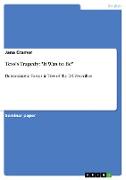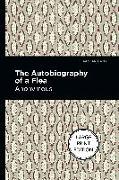Tess's Tragedy: "It Was to Be"
BücherAngebote / Angebote:
Seminar paper from the year 2013 in the subject English Language and Literature Studies - Literature, grade: 1, 3, University of Mannheim, language: English, abstract: Thomas Hardy's novel Tess of the D'Urbervilles was published in 1891, a time coined by change in technique and sciences. The English naturalist Darwin established his theory about evolution and natural selection, and physicists discovered that there are fixed elemental laws which inanimate objects follow. These discoveries also spread in the domains of humanities. In his essay "The Experimental Novel", published in 1880, the French writer Émile Zola claims that the scientific method, which is observation and experimentation, can and should be applied to literature as well. He argues that writers can experiment with their characters like scientists do with their objects of study by placing them into certain surroundings and changing some conditions in the fictional world. These different surroundings and conditions then will determine the novel's course. Thus, Zola concludes that if the inanimate world is fixed by certain laws, "[a] like determinism will govern . . . the brain of a man" (17) and the character's fate is already fixed by the novel's setting.
The subtitle of Tess of the D'Urbervilles - "A Pure Woman" - has aroused a need for discussion in the Victorian Age as well as today. There are "[t]hose who thought the 'little harlot' deserved hanging . . . [and] those who pitied her as a 'poor wronged innocent'" (Hardy 2003, xix). The question of guilt is a central theme in Hardy's novel. Is Tess "more sinned against than sinning" (232)? Having Zola's theory in mind, it is rather the first that applies for Tess's story.
Folgt in ca. 10 Arbeitstagen




